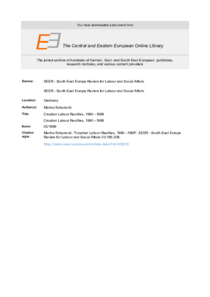Croatian labour realities, 1990 –1999

South-East Europe Review for labour and social affairs : SEER
1999
2
3
185-208
trade union ; economic development ; trade union
Economic development
English
Bibliogr.
"In the pre-transition period at the end of the ‘80s, within ex-Yugoslavia the Republic of Croatia reached a level of development which put it among the top ten newly-industrialised countries of the world, according to the method and criteria of the UN. In 1989, Gross National Product per capita amounted to US$5,000. However, the war, the crisis of transition and the loss of markets almost halved GNP, tripled the unemployment rate, increased the current account deficit (to levels relatively higher than any other European country in transition), increased the external debt, lowered credibility and reduced the level of investment to amortisation. The macroeconomic and microeconomic environment, mostly because of the mistakes committed in the process of privatisation, chiefly the crediting of wrong companies and entrepreneurs, is characterised by different monopolies, oligopolies and, concerning ownership, market and political structures. Numerous deviations appear in such an environment, ranging from corruption and small crime to organised crime at all levels and in all sectors of the economy and of society. All the changes so far have reduced the workers' rights that had already been achieved. New legal provisions and measures were not appropriate, often they were unjust and they have directly contributed to the further social division and impoverishment of the work-dependent population."
Digital;Paper
The ETUI is co-funded by the European Union. Views and opinions expressed are however those of the author(s) only and do not necessarily reflect those of the European Union or the ETUI.